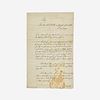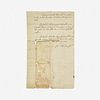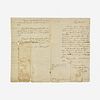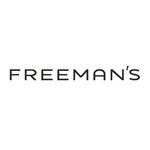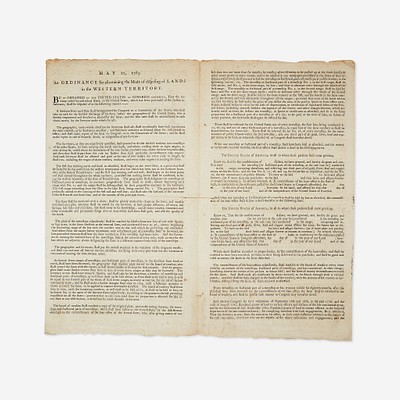[Americana] Franklin, Benjamin Autograph Letter, signed
About Seller
2400 Market St
Philadelphia, PA 19147
United States
Established in 1805, Freeman’s Auction House holds tradition close, with a progressive mind-set towards marketing and promotion, along with access to a team of top experts in the auction business. And now with offices in New England, the Southeast, and on the West Coast, it has never been easier to ...Read more
Two ways to bid:
- Leave a max absentee bid and the platform will bid on your behalf up to your maximum bid during the live auction.
- Bid live during the auction and your bids will be submitted real-time to the auctioneer.
Bid Increments
| Price | Bid Increment |
|---|---|
| $0 | $25 |
| $500 | $50 |
| $1,000 | $100 |
| $2,000 | $200 |
| $3,000 | $250 |
| $5,000 | $500 |
| $10,000 | $1,000 |
| $20,000 | $2,000 |
| $30,000 | $2,500 |
| $50,000 | $5,000 |
| $100,000 | $10,000 |
About Auction
Feb 17, 2022
Freeman’s February 17 Books and Manuscripts auction is an Americana collector’s delight, with highlights led by an extremely rare Northwest Territory Land Ordinance from 1785. Curated by Darren WInston, Head of the Books and Manuscripts Department at Freeman's. Freeman's info@freemansauction.com
- Lot Description
[Americana] Franklin, Benjamin Autograph Letter, signed
At the close of the American Revolution, Benjamin Franklin informs American Consul to France, Thomas Barclay, about his new commission to settle European debts
Passy, (France), Feb(ruary). 16, 1783. Folio. 3 pp. Autograph letter, signed by Benjamin Franklin ("B. Franklin"), while serving as Minister Plenipotentiary to France, to American Consul to France, Thomas Barclay. Creasing from original folds; six-inch horizontal separation along top fold of third page, small tape repair to recto of same; small separations and holes at other folds of third page, with losses to some words in second, third, and fourth paragraphs; staining at bottom of third page, affecting some letters, and obscuring docketing on fourth page; some scattered spotting and small separations on first page; spotting at bottom of first page partially affecting the letter "B" and the flourish of the letter "n" in his signature.
As the American Revolution draws to a close, only six months before the signing of the Treaty of Paris, Benjamin Franklin writes to his colleague Thomas Barclay, to inform him of his newly appointed role as commissioner of public accounts in Europe: "Sir, The within is a Copy of a Resolution of Congress, which I forward to you, lest you should not have receiv'd it by any direct Conveyance. Your Appointment to this Service gives me great Pleasure, as I am sure your Execution of it will be of great Use to the United States. I hope therefore that as soon as you have expedited the Congress Goods, you will come up to Paris, and enter upon the Business. In the mean time I will endeavour to prepare every thing, so far as may depend on me, for rendering the Work easy to you. We daily expect from London 100 Passports that have been promis'd us, for American Ships. As soon as they arrive We shall forward a Number to you, to be dispos'd of as you shall judge proper; With great Esteem I have the honour to be, Sir, Your most obedient & most humble Servant B Franklin."
Thomas Barclay (1728-93) was appointed America's first consul to France on October 5, 1781. Upon arrival, he worked closely with Benjamin Franklin (1706-90) and his grandson, William Temple Franklin (1760-1823), arranging shipments of much needed supplies such as uniforms and blankets for George Washington's troops in America. As the war neared its end and peace lingered on the horizon, the need to account for public money spent across Europe to sustain the war effort grew especially urgent. On November 18, 1782 Congress appointed Barclay commissioner of public accounts in Europe, with the express purpose "to liquidate and finally to settle the accounts of all the servants of the United States, who have been entrusted with the expenditure of public money in Europe, and all other accounts of the United States in Europe, and to commence and prosecute such suits, causes, and actions, as may be necessary for that purpose, or for the recovery of any property of the said United States, in the hands of any person or persons whatsoever." The job proved burdensome, not only because of shoddy bookkeeping and scattered financial records, but also because of Barclay's poor health. "The task confronting Barclay and his audit team was to meet the need John Adams had perceived five years earlier when he observed that 'prodigous' sums were being spent but he could find no books of account showing what was being received for those sums." (p. 123, Roberts, Thomas Barclay (1728-1793), Consul in France, Diplomat in Barbary, 2008).
Franklin's letter appears in its entirety on page 174 in The Papers of Benjamin Franklin, Vol. 39, January 21 through May 15, 1783 (Yale University Press, 2008).
A rare and important letter written entirely in Franklin's own hand.
Thomas Barclay, thence by descent to the present owner.
- Shipping Info
-
No lot may be removed from Freeman’s premises until the buyer has paid in full the purchase price therefor including Buyer’s Premium or has satisfied such terms that Freeman’s, in its sole discretion, shall require. Subject to the foregoing, all Property shall be paid for and removed by the buyer at his/ her expense within ten (10) days of sale and, if not so removed, may be sold by Freeman’s, or sent by Freeman’s to a third-party storage facility, at the sole risk and charge of the buyer(s), and Freeman’s may prohibit the buyer from participating, directly or indirectly, as a bidder or buyer in any future sale or sales. In addition to other remedies available to Freeman’s by law, Freeman’s reserves the right to impose a late charge of 1.5% per month of the total purchase price on any balance remaining ten (10) days after the day of sale. If Property is not removed by the buyer within ten (10) days, a handling charge of 2% of the total purchase price per month from the tenth day after the sale until removal by the buyer shall be payable to Freeman’s by the buyer. Freeman’s will not be responsible for any loss, damage, theft, or otherwise responsible for any goods left in Freeman’s possession after ten (10) days. If the foregoing conditions or any applicable provisions of law are not complied with, in addition to other remedies available to Freeman’s and the Consignor (including without limitation the right to hold the buyer(s) liable for the bid price) Freeman’s, at its option, may either cancel the sale, retaining as liquidated damages all payments made by the buyer(s), or resell the property. In such event, the buyer(s) shall remain liable for any deficiency in the original purchase price and will also be responsible for all costs, including warehousing, the expense of the ultimate sale, and Freeman’s commission at its regular rates together with all related and incidental charges, including legal fees. Payment is a precondition to removal. Payment shall be by cash, certified check or similar bank draft, or any other method approved by Freeman’s. Checks will not be deemed to constitute payment until cleared. Any exceptions must be made upon Freeman’s written approval of credit prior to sale. In addition, a defaulting buyer will be deemed to have granted and assigned to Freeman’s, a continuing security interest of first priority in any property or money of, or owing to such buyer in Freeman’ possession, and Freeman’s may retain and apply such property or money as collateral security for the obligations due to Freeman’s. Freeman’s shall have all of the rights accorded a secured party under the Pennsylvania Uniform Commercial Code.
-
- Buyer's Premium



 EUR
EUR CAD
CAD AUD
AUD GBP
GBP MXN
MXN HKD
HKD CNY
CNY MYR
MYR SEK
SEK SGD
SGD CHF
CHF THB
THB![[Americana] Franklin, Benjamin Autograph Letter, signed](https://s1.img.bidsquare.com/item/l/1094/10945485.jpeg?t=1NcmVq)
![[Americana] Franklin, Benjamin Autograph Letter, signed](https://s1.img.bidsquare.com/item/s/1094/10945485.jpeg?t=1NcmVq)
